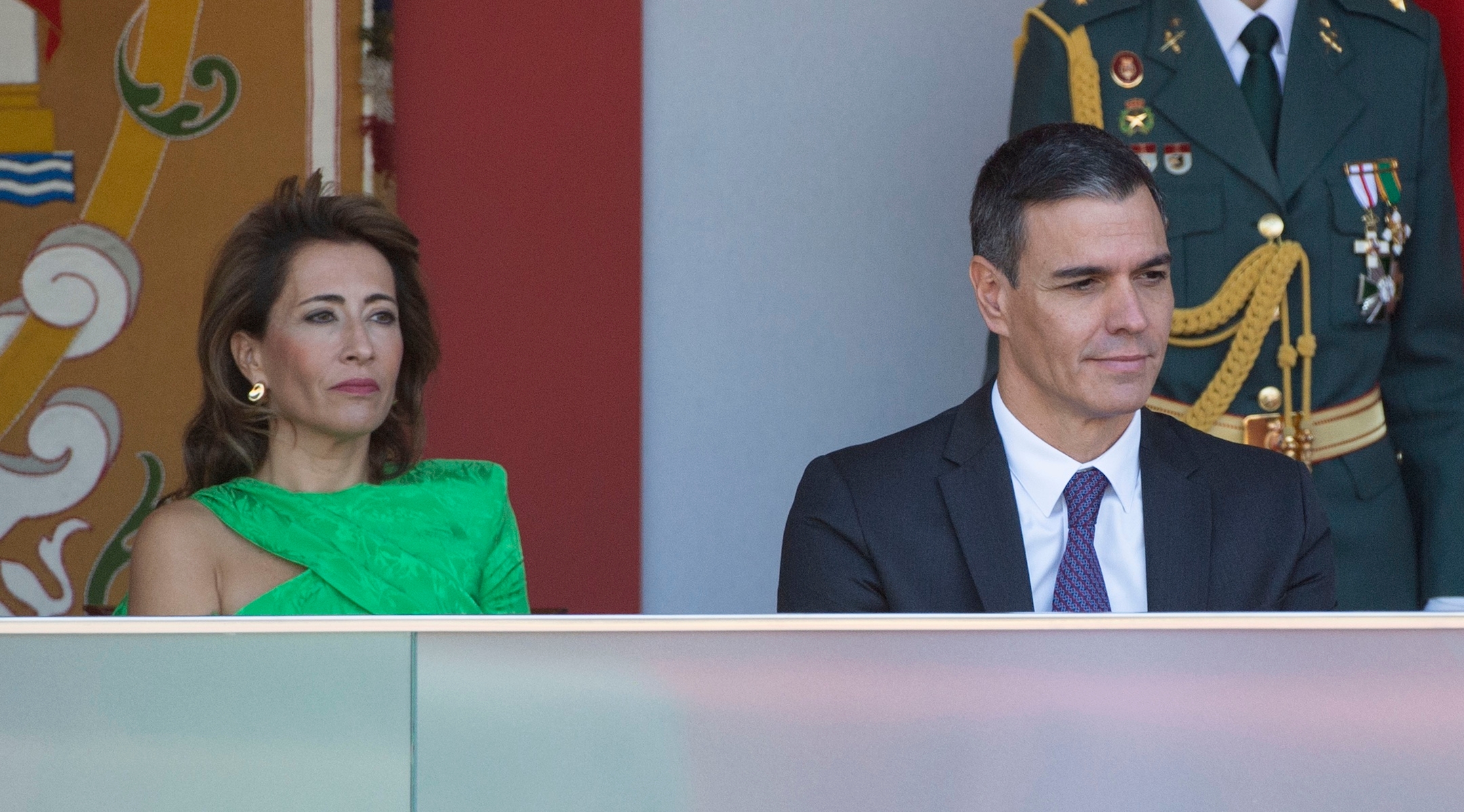Spain-Israel tensions flare and multiple Spanish synagogues are hit with anti-Israel graffiti
Ione Belarra, Spain’s acting social rights minister, called to “urgently suspend diplomatic relations with the state of Israel”

Spanish Prime Minister Pedro Sanchez and Acting Minister of Transport, Mobility and Urban Agenda Raquel Sanchez watch a military parade at the Plaza de Canovas del Castillo in Madrid, Oct. 12, 2023. (Alberto Ortega/Europa Press via Getty Images)
MADRID (JTA) — Political tensions escalated between Israel and Spain this past week as Spanish Jews reeled from a series of incidents outside synagogues.
Ione Belarra, Spain’s acting social rights minister, called to “urgently suspend diplomatic relations with the state of Israel” on Wednesday, citing Israel’s response in Gaza to Hamas’ Oct. 7 attacks that killed over 1,400.
“We ask our partner that, as the Government of Spain, we bring Netanyahu before the International Criminal Court for war crimes,” she said earlier in the week in a video posted to X, the platform formerly known as Twitter.
Without using specific names, the Israeli embassy in Madrid called on Spanish President Pedro Sanchez to condemn the “shameful statements” of some members of his government who have chosen to “align themselves with the terrorism” of Hamas.
The statement added that some in government have endangered “the security of the Jewish communities in Spain, exposing them to the risk of a greater number of antisemitic incidents and attacks.”
Multiple Spanish synagogues have been hit with graffiti tied to the Israel-Hamas conflict, which has also led to thousands of deaths in Gaza. Madrid’s main synagogue in the heart of the Chamberí district was defaced with graffiti that read “Free Palestine” next to a crossed-out Star of David the day after the Oct. 7 attacks. “Free Palestine” was also sprayed throughout a medieval Jewish neighborhood in Catalonia, which is home to Barcelona.
In Melilla, a small Spanish enclave nestled on the North African coast near Morocco, a group of protesters gathered in front of a synagogue shouting “murderous Israel” and “freedom for the Muslim people” while burning an Israeli flag, forcing police to intervene.
Spanish Foreign Minister Jose Manuel Albares summoned Israel’s ambassador to Madrid, Rodica Radian-Gordon, on Monday afternoon, expressing his government’s displeasure over the Israeli embassy’s statement, as El Pais reported. Albares termed the statement an “unfriendly gesture.”
Albares’ ministry also issued a statement in response, asserting that they “categorically reject the falsehoods expressed in the Israeli Embassy’s statement about some of its members and does not accept unfounded insinuations about them.”
“In any case, the position of the Government of Spain as a whole with respect to the terrorist attacks perpetrated by Hamas is clear: categorical condemnation, demand for the immediate and unconditional release of hostages and recognition of Israel’s right to defend itself within the limits set by International Law and International Humanitarian Law,” the statement continued.
Despite Albares’ statements, Belarra, who is part of the left-wing populist Podemos party, continued to sharply condemn Israel’s policies throughout the week. Yolanda Diaz, acting second vice president and leader of the left-wing Sumar party, said that recognition of a Palestinian state should be one of the first measures of the country’s next political coalition, which no party has successfully formed since July elections.
In a statement condemning the protests in Melilla, the Federation of Jewish Communities of Spain wrote in a news release that anti-Israel graffiti has also been found in the Jewish quarter of the medieval town of Besalú, on the door of a synagogue in Girona and outside the house of a Jewish family in Madrid.
Historically, Melilla has been known for its sizable Jewish population, and they have been targeted by protesters in past flare-ups in the Middle East. Many of Melilla’s residents, however, have prided themselves on a culture of peaceful cultural and religious coexistence between Jews, Muslims and Christians for more than a century and a half.
The mayor of Melilla, Juan José Imbroda, said he hopes that the “exemplary coexistence” of the city’s different cultures is not affected by “external conflicts.”
Rates of antisemitism, while historically high in Spain, have dropped significantly in recent years. According to a 2023 report from the Anti-Defamation League, Spain now boasts one of the lowest rates of antisemitic incidents in Europe.
The president of Colombia has also sharply condemned Israel online in the past week and floated the possibility of completely cutting ties with Jerusalem.
This article originally appeared on JTA.org.

















